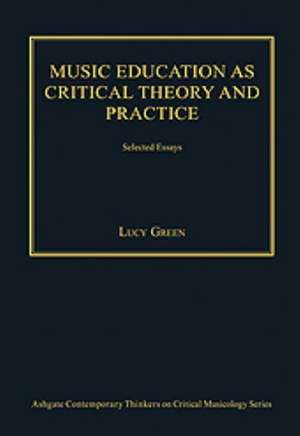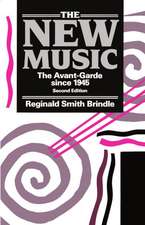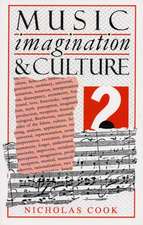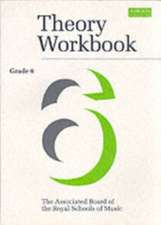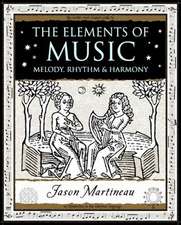Music Education as Critical Theory and Practice: Selected Essays: Ashgate Contemporary Thinkers on Critical Musicology Series
Autor Lucy Greenen Limba Engleză Hardback – 4 feb 2014
| Toate formatele și edițiile | Preț | Express |
|---|---|---|
| Paperback (1) | 221.07 lei 6-8 săpt. | |
| Taylor & Francis – 14 oct 2024 | 221.07 lei 6-8 săpt. | |
| Hardback (1) | 1019.22 lei 6-8 săpt. | |
| Taylor & Francis – 4 feb 2014 | 1019.22 lei 6-8 săpt. |
Preț: 1019.22 lei
Preț vechi: 1444.57 lei
-29% Nou
Puncte Express: 1529
Preț estimativ în valută:
195.03€ • 208.55$ • 162.61£
195.03€ • 208.55$ • 162.61£
Carte tipărită la comandă
Livrare economică 17 aprilie-01 mai
Preluare comenzi: 021 569.72.76
Specificații
ISBN-13: 9781409461005
ISBN-10: 1409461009
Pagini: 376
Dimensiuni: 169 x 244 x 32 mm
Greutate: 0.7 kg
Ediția:New.
Editura: Taylor & Francis
Colecția Routledge
Seria Ashgate Contemporary Thinkers on Critical Musicology Series
Locul publicării:Oxford, United Kingdom
ISBN-10: 1409461009
Pagini: 376
Dimensiuni: 169 x 244 x 32 mm
Greutate: 0.7 kg
Ediția:New.
Editura: Taylor & Francis
Colecția Routledge
Seria Ashgate Contemporary Thinkers on Critical Musicology Series
Locul publicării:Oxford, United Kingdom
Public țintă
AcademicNotă biografică
Lucy Green is Professor of Music Education at the Institute of Education, University of London UK. Her research interests are in the sociology of music education, specializing in meaning, ideology, gender, popular music, inclusion, equality, informal learning, and new pedagogies. She has lectured and presented keynotes in countries around the world, and serves on the Editorial Boards of twelve journals, including Music Education Research, Radical Musicology, Popular Music, the British Journal of Music Education, the Journal of World Popular Music, and Research Studies in Music Education. Lucy led the research and development project Informal Learning in the Music Classroom within the British movement Musical Futures, and this work is now being implemented in schools across the UK and in Australia, Canada, Singapore, and parts of the USA, Brazil, Cyprus and other countries. Her more recent research took that work forward into instrumental tuition, . Her first four authored books are: Music on Deaf Ears: Musical Meaning, Ideology and Education (1988/2008), Music, Gender, Education (1997), How Popular Musicians Learn: A Way Ahead For Music Education (2001) and Music, Informal Learning and the School: A New Classroom Pedagogy (2008). Her edited book, Learning, Teaching and Musical Identities: Voices Across Cultures came out in 2011. Her next book, to be published in 2014, is a practical handbook for teachers bringing together work in classrooms and instrumental tuition, entitled Hear, Listen, Play! How to Free Your Students' Aural, Improvisation and Performance Skills.
Cuprins
One: Music Education as a Reproductive Force – Ideology, Musical Meaning, Social Groups and Identity; 1: To construe and to construct... what do we mean by ‘the sociology of music education’, and what’s the point of it anyway?; 2: Why ‘Ideology’ is Still Relevant for Critical Thinking in Music Education; 3: Music Education, Cultural Capital, and Social Group Identity; 4: Musical Meaning and Social Reproduction: A case for retrieving autonomy; 5: Musical Identities, Learning and Education: Some Cross-cultural Issues 1; Two: Gender and Music Education; 6: Music, Gender and Education A Report on Some Exploratory Research; 7: Gender identity, musical experience and schooling; 8: The emergence of gender as an issue in music education; Three: Assessment and Curriculum Content in Music Education; 9: The Assessment of Composition: Style and Experience; 10: Music as a media art; 11: From the Western classics to the world: secondary music teachers’ changing attitudes in England, 1982 and 1998; Four: Informal Learning and the Music Classroom; 12: What Can Music Educators Learn from Popular Musicians?; 13: Informal Learning in the Music Classroom: A Seven-Stage Program; 14: Popular music education in and for itself, and for ‘other’music: current research in the classroom; 15: Group cooperation, inclusion and disaffected pupils: some responses to informal learning in the music classroom; 16: Teenagers, Musical Identity and Classical Music: The Classroom as a Catalyst; Five: Aural Learning, Informal Learning and the Instrumental Teaching Studio; 17: Musical “learning styles” and “learning strategies” in the instrumental lesson: Some emergent findings from a pilot study; 18: Informal Learning and Aural Learning in the Instrumental Music Lesson: A Research-And-Development Pilot Project
Descriere
This collection of previously published articles, chapters and keynotes traces both the theoretical contribution of Lucy Green to the emergent field of the sociology of music education, and her radical ’hands-on’ practical work in classrooms and instrumental studios. The selection includes Green’s highly influential work on bringing informal learning into formal music education settings as well as an introduction which situates each essay in relation to some of the major influences which affected Green’s intellectual journey from the 1970s to the present day.
